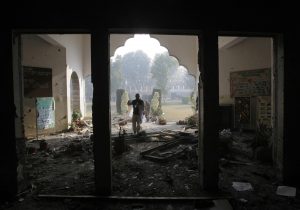Umair Jamal

Last week, Pakistan Prime Minister Imran Khan said in an interview that his government is negotiating with some sections of the Tehreek-e-Taliban Pakistan (TTP) that are seeking reconciliation with the Pakistani state.
“There are different groups which form the TTP and some of them want to talk to our government for peace. So, we are in talks with them. It’s a reconciliation process,” Khan said in an interview twith TRT World.
When asked by the interviewer if the Afghan Taliban were mediating in this process, Khan responded in the affirmative. “Since the talks were taking place in Afghanistan, so in that sense, yes,” he said.
Khan’s admission that Pakistan is negotiating with the TTP offers some insights into Islamabad’s approach to the issue and its various complexities.
Apparently, Pakistan believes that the Taliban could play an effective role in neutralizing the threat that the TTP poses to Pakistan, given that the TTP’s leadership is based in and operates from Afghanistan.
Statements by Pakistani lawmakers in the past suggest that Pakistan expects the Taliban to play a decisive role in the matter. This expectation probably stems from the support that Pakistan extended to the Taliban over many years.
This support, which the country calls a necessary engagement to deal with a host of issues, continues to this day as Pakistan pushes the international community to recognize the “new reality in Afghanistan” in the form of the Taliban regime.
However, it is unclear if Pakistan’s patronizing of the Taliban will help its case.
Early developments indicate that Taliban will take some sort of action on Pakistan’s security concerns, but we shouldn’t expect miracles as the group is not likely to expel or handover TTP militants to Pakistan for several reasons. For years, TTP and the Taliban have had close ties, and have lived, fought, and grieved together. Fighters in their ranks also share family ties, extending from ethnic linkages to marriages and friendships.
Moreover, the Taliban’s middle and lower ranks are not likely to accept their leadership’s decision if forceful action is taken against the TTP on Pakistan’s wishes. Arguably, the Taliban’s leadership wouldn’t want its fighters to see them as mere pawns of Islamabad.
This would undermine the Taliban leadership’s stature at a time when the Islamic State of Khorasan (IS-K) is intent on undermining its hold on power, be it via direct attacks or dividing the group from within.
Already, we have seen many videos in which Taliban fighters can be seen wanting to extend the implementation of Sharia to Pakistan, and some even ripping off the Pakistani flag from trucks carrying humanitarian assistance to Afghanistan. There have also been reports of clashes between Pakistani troops and Taliban fighters. For many, this sentiment within the Taliban fighters’ ranks shows that there is not much love lost for Pakistan’s stretched role in managing Afghanistan and tribal areas along the Pakistan-Afghanistan border.
While it is possible that the Taliban may have agreed to offer its mediation, it is unlikely that the group can do much beyond offering facilitation. For instance, talks between Pakistan and the TTP have been going on for more than a month now, but the group’s attacks on Pakistan’s security forces have only increased.
To an extent, this indicates that the Taliban have not forced the Pakistani security agencies’ demands on the TTP. During September, TTP claimed 37 attacks, including two suicide attacks on Pakistan’s security forces. The group claims that these attacks killed more than 70 security officials.
The nature of these talks raises questions about Pakistan’s intent in dealing with the TTP at a time when the group appears to have regained its lost strength. Earlier this week, TTP said in a statement that the Sheheryar Mehsud group, a splinter of the TTP, had joined its ranks. The reintegration of splinter groups has improved the TTP’s overall standing, reach, and ability to strike at targets in the tribal areas of Pakistan. These developments indicate that the group is poised to increase its attacks, and appears disinterested in Pakistan’s amnesty offer until the government imposes sharia law in the country.
The situation raises questions about Pakistan’s limitations vis-à-vis its ties with Taliban and its ability to persuade the group into taking action against TTP. At this stage, the important question is what happens if the Taliban doesn’t force TTP into making an agreement with Pakistan. Will Pakistan continue to take casualties in an expectation that one day the Taliban will pay attention to Islamabad’s concerns? As explained, it seems that the Taliban won’t do much on the issue unless the group is ready for an internal revolt within its ranks.
This leaves Pakistan with difficult choices. Should the country impose conditions for its support to the Taliban? Can we expect a military action from Pakistan across the border into Afghanistan if the Taliban doesn’t rein in the TTP?
We can expect Pakistan to impose stringent conditions on Afghans crossing into Pakistan. Eventually, Islamabad may also impose some conditions on bilateral trade with Afghanistan. This push and pull situation is likely to continue in the coming weeks and months.
Over the longer term, the issue could well unravel Pakistan’s ties with the Taliban.
No comments:
Post a Comment